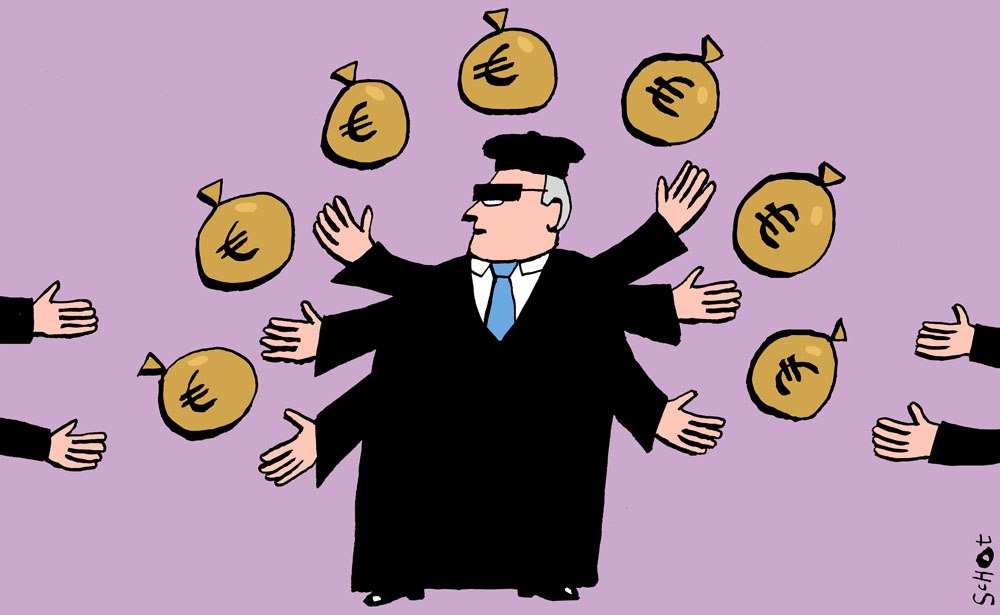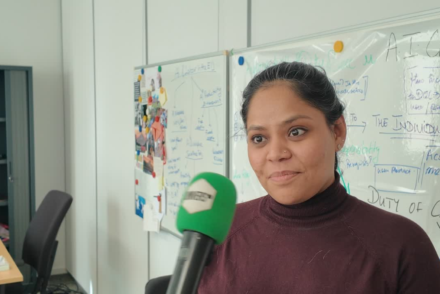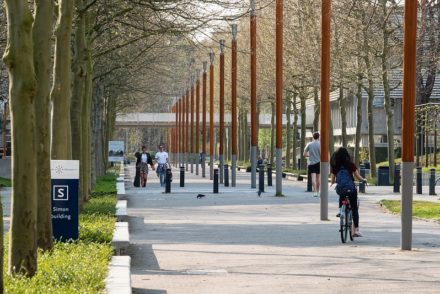The dismantling of Tilburg’s PhD factory
Dissertations of questionable quality are approved, professors walk away with hundreds of thousands of euros, and family businesses are paid over a million in promotion bonuses. Over the years, Tilburg University has grown into a lucrative PhD factory. How could this happen, and what did the university do to stop it?

When Wim Drees takes office as the new dean of the Humanities Faculty in January 2015, he is greeted by a number of unpleasant surprises. He learns that his predecessor, Arie de Ruijter, has made highly unusual arrangements with some professors. There is an agreement with emeritus professor Jaap van den Herik, for example, who continues to supervise ongoing PhD trajectories now that he has retired. Van den Herik receives a compensation of 25.000 euros for each successful external PhD candidate he produces, and half that amount for internal PhD candidates. A similar agreement for ‘promotion bonuses’ has been made with Ruben Gowricharn, who served as a non-salaried professor at Tilburg University from 2007 to 2017.
In addition to the agreements made with Van den Herik and Gowricharn, arrangements have been made with three non-salaried professors (about which more below), and arrangements made with professor of social psychology John Rijsman and professor of communication Sheila McNamee attract attention. Rijsman was exempted from professorial tasks in 2000 to focus on the supervision of external PhD candidates, and he supervises several PhD trajectories at the Humanities Faculty when Wim Drees takes office. McNamee was taken on by the faculty as a non-salaried professor in 2012, so that she could commit herself to the supervision of PhDs. Both non-salaried professors do not receive payment. In 2014, Arie de Ruijter did offer Rijsman a compensation of 12.500 for each PhD he produced, but Rijsman declined.
Arie de Ruijter
Arie de Ruijter took office as the dean of the Social Sciences faculty in 2000. He later became dean of the faculty of Communication and Culture, a small faculty that merged with Humanities, where he subsequently served as dean from 2007 to 2015.
PhD factory
Arie de Ruijter set up a PhD factory. Drees considers steps. He says about Van den Herik: “I wouldn’t make those agreements again. But they were made, so I felt we had to stick to that.” He does contact McNamee, Rijsman and Gowricharn. To get clarification and to demarcate as much as possible. Drees proposes to Gowricharn, who acted from his company De Promotiekamer, to only pay for promotions that have been approved by the promotion committees at the latest in 2017. And at a declining premium, because the promotion bonus that the university receives is decreasing. “He wasn’t happy about it, but he resigned himself to it.” Rijsman is also being asked to phase out. After consultation with his legal advisor, it is decided to divide the PhD defenses among the faculties of social sciences and humanities.
In August, more problems emerge. The faculty’s budget report shows some strikingly high payments. It is known that for each PhD trajectory De Ruijter spends 30.000 euros, one-third of the total promotion bonus, on PhD guidance. This allowed De Ruijter to produce 32 PhDs during his term as dean from 2007 to 2015 – that’s four successful PhDs per year, whereas Tilburg University professors have an average production rate of 0,8. What is not known, is that De Ruijter hires a beauty salon and a consultancy firm to provide that guidance, as Drees discovers. Alarmed, he notifies the university’s Executive Board.
Corporate investigations
By the fall of 2015, two types of arrangements are on the table. There are arrangements with professors, which are unusual but transparent. And there are arrangements with De Ruijter’s aides, the beauty salon and the consultancy company, which leave unclear who receives payment for which services. To clear this up, corporate investigators were hired. “We have other matters to attend to rather than delving into cases like these, and we lack the expertise,” says rector magnificus Emile Aarts. In addition, the university believes it should not be the judge of the evidence it has collected itself.
Meanwhile, Drees is not passively awaiting the investigations. To Jaap van den Herik he makes a proposal to have faculty members take over PhDs, but this proposal is answered with a rejection. The three unsalaried professors who were previously left unbothered are now approached by Drees as well. With one of these professors no financial agreements have been made, and this professor has not produced PhDs. The university keeps the employment relationship in place until the expiry of this professor’s contract.
With the second professor, the university has made an agreement for a bonus of 10.000 for each produced PhD. This arrangement is converted into a 0,2 FTE contract. “This way, there are no separate payments for approved PhDs. And there is no reward for approving something of insufficient quality.” With the third professor, an arrangement was in place that granted a bonus for produced PhDs to his employer. This arrangement is converted into a parttime employment contract as well. “This was all discussed with those who were involved, without disclosing information on the case surrounding De Ruijter.”
Going public
At this point, going public is not something the university desires. Aarts: “We were conducting an investigation into De Ruijter, which had to be done in complete secrecy. We therefore decided not to bring anything that could negatively influence the investigative developments to public attention. That also meant holding off a response to Van den Herik. He had made those contracts with De Ruijter, who would immediately come into the picture, and that was very undesirable.” The university did not want the course of justice to be perverted, and protecting the privacy of professors and PhD candidates was its first concern.
Not that De Ruijter is out of the picture. The university’s Board of Executives revokes his right to act as promoter for five PhD graduations that are planned to take place in the fall of 2015. In September 2015, corporate investigators discover that two companies that received more than a million euros are registered to De Ruijter’s niece and nephew. What follows is a conversation between De Ruijter and the Board of Executives, Drees says. The corporate investigative team also speaks to De Ruijter and his niece. “He tried to explain his view, that he did not cross any boundaries.” The investigation is concluded in December 2015, and a report is presented to the Board of Executives. In April 2016, the university presses charges against De Ruijter for suspected embezzlement and forgery. After that, things go quiet.
Charged too much
It’s the end of 2016 when there is a new development. On October 5th, 2016, Van den Herik charges too much for a PhD that has partly been financed with university money. The university also lets Van den Herik know that the billing rules have changed. Drees schedules a conversation with Van den Herik. “We wanted to sort out very precisely what we were still talking about.” It concerns six dissertations – three of which have been completed in September 2018, and three of which are still in progress. Drees speaks with Van den Herik’s legal counsel, for which he asks advice from the university’s legal department. Through that department, and sometimes directly, Drees keeps the Board of Executives informed on the situation.
Drees and Van den Herik come to an agreement at the start of 2017. A letter dated 1 February 2017 states that for each of the remaining six PhDs a payment of 75.000 euros will be made to Van den Herik. But then something unexpected happens. On Saturday 18 February 2017, the investigative journalism radio program Argos reveals that large payments have been made to De Ruijter’s family members. The world now knows that something is going on, and De Ruijter, who is unaware that charges have been pressed against him, hears about it on the radio.
Drastic measures
The Board of Executives now takes over in the Van den Herik case, Drees says. “They wanted to take a drastic measure by not making any payments at all anymore.” Is the university making rushed decisions, or is this an obvious time to take such drastic measures? Aarts slams his hand on the table. “Of course it was! The reason for which we were staying silent was no longer there.” On April 5 2017, a letter is sent to Van den Herik in which the university urges him to forgo the agreed bonus. It is highly unusual to receive payment per produced PhD, and the university believes a culture change is needed. In addition, the university writes, society’s trust in the academic world is at stake. In a letter dated 22 May 2017, word finally gets out: the university is no longer paying. “Van den Herik wanted to go into negotiation with us”, Aarts says. “But if you believe something to be unethical when it’s about a hundred thousand euros, it’s still unethical when it’s about fifty thousand euros.”
Professor with integrity
Emile Aarts says that Jaap van den Herik, whom he has known for thirty-five years, is a professor with integrity. Although Aarts would not call Van den Herik’s behavior unethical, he does call it “unusual, and difficult to explain”. He does not doubt the scientific quality of the dissertations Van den Herik supervised. According to Aarts, the PhDs were carefully handled, the composition of the committees varied sufficiently. “There was no reason to have that investigated.”
Meanwhile, several days after the Argos radio show, politician Jasper van Dijk (SP) raises questions in parliament on 22 February 2017 about De Ruijter’s payments to family members. Van Dijk asks the Minister of Education, Jet Bussemaker, whether the university’s Board of Executives should have denounced the agreement that PhD guidance was offered by external companies. Following these parliamentary questions, conversations take place between the university and the Dutch Inspectorate of Education. On 20 April 2017, Bussemaker states that the Board of Executives was not aware of agreements made between De Ruijter and his family members, and that the university took action when these arrangements came to light in 2015. The university did not inform the Inspectorate about the existence of arrangements with professors, Tilburg University’s spokeswoman Tineke Bennema says.
Lawsuit
The university has stopped making payments, but Jaap van den Herik doesn’t just accept it. He files a lawsuit against the university. The university decides not to settle with Van den Herik, but to defend its case. This may potentially result in a loss, and a verdict carries the consequence that the unusual arrangements with professors will become public.
The university wants to make a statement, Aarts says. Within the university, this statement is made by sharpening the rules concerning the supervision of (external) PhD candidates. A second supervisor is made mandatory, for example, and external PhD candidates must be officially registered at least two years prior to their intended PhD graduation date. “We will not make the same mistake twice.” To the outside world, the university wants to make clear that it considers the arrangements that were made unethical. “Tax money was used, so we felt that we needed to reach out to society in a way.”
In short, the legal defense put forward by the university argues that the agreement was undesirable and that the university cannot be kept to it. That would be in conflict with societal interests and public order. But the judge does not go along with this and says that the university should have taken action immediately after the arrangement with Van den Herik was brought to its attention. The university continued to make payments, amounting to a total of 224.445 euros. Although Aarts explains that the university wanted to carefully consider the issue, the judge rules against the university in the verdict of 18 July 2018.
Diaries
On Saturday 1 September, well over a month after the verdict, Argos reveals that Ruben Gowricharn has also received payments for producing PhDs. He was paid an amount of 35.000 euros on nine occasions, and 24.000 euros on one occasion. Taken together, the payments made to Van den Herik and Gowricharn for producing PhDs amount to 638.445 euros.
One week later, on September 8th, Argos addresses the 77 dissertations supervised by John Rijsman. Professor of evolutionary social psychology Bram Buunk of Groningen University reviews six of these dissertations and states that they do not qualify as dissertations at all. “None of those dissertations contain any kind of research data.” According to Buunk, the dissertations describe lengthy processes of self-discoveries, like diaries, in which empirical research data are lacking altogether. Rijsman disagrees, arguing that Buunk has not been following the latest developments within the field of social psychology. The dissertations contain methodical self-reflections, Rijsman states, which are just as empirical as questionnaires.
What’s next?
The current Ministers of Education, Arie Slob and Ingrid van Engelshoven, will ask Tilburg University for clarification. They will also discuss the matter with the Association of Universities in the Netherlands (VSNU). The Ministers will want to know why Tilburg University has so many dubious practices. The university points out that academic entrepreneurship was encouraged around the turn of the century, resulting in a growing number of external PhD candidates. In addition, the relationship between professor and pupil was more of an individual matter in the past, Drees says. Professors, and deans especially, were barely monitored as they went about their business.
When will there come an end to the scandals? For the university as a whole, that’s a difficult question to answer. Given its entrepreneurial past, it’s not unthinkable that more unusual arrangements will surface at other faculties. But at the faculty that is now known as the Tilburg School of Humanities and Digital Sciences, order seems to have been restored. Drees: “It’s difficult to say something isn’t there, but I believe I know the faculty quite well by now. I am convinced that this is all there is.”
Jaap van den Herik is not willing to make any statements about the matter as long as the university can still lodge an appeal. This is possible until 18 October.
Ruben Gowricharn states that ‘De Promotiekamer’ “bore all costs, dropout risks and expenses for extra guidance.” According to Gowricharn, the dropout rate was high and, in addition, a PhD trajectory took up six to seven years, which meant that the relative compensation he received for his services was not high. Gowricharn also states that he did not make agreements on PhD bonuses with Arie de Ruijter, but with Philip Eijlander, who was the rector magnificus at the time.
Philip Eijlander states that he had no knowledge of the arrangement with Gowricharn until the Argos broadcast. “I did not agree to any arrangement that resulted in promoters receiving money for their supervisory activities. That would be completely absurd, because it’s part of the job.”







